
We kindly inform you that, as long as the subject affiliation of our 300.000+ articles is in progress, you might get unsufficient or no results on your third level or second level search. In this case, please broaden your search criteria.

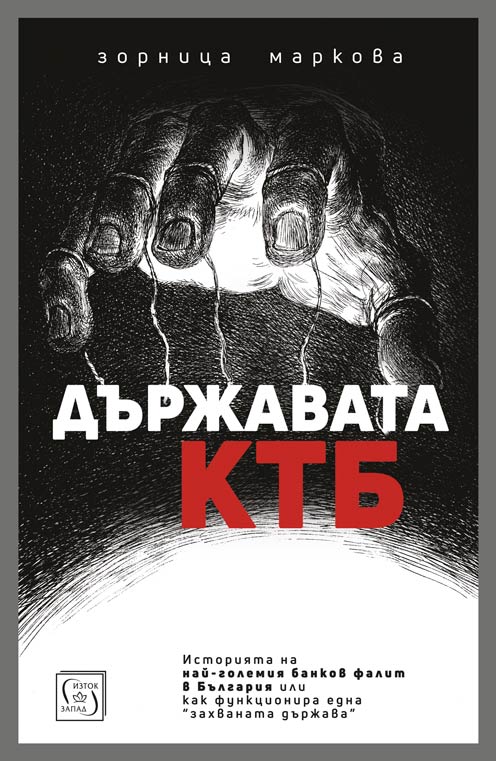
This book is the result of a two-year journalistic investigation that traces the history of Corporate Commercial Bank from its origin to its bankruptcy (1994-2014). The investigation was conducted on the basis of dozens of meetings with direct participants or witnesses of the events, representatives of state structures, political parties, business, regulators. In the process, hundreds of official and informal documents have been analyzed. Access to information by Bulgarian and international organizations has been requested many times. The collected facts, data, documents, and exclusive testimonies included in this book contain for the first time conclusive evidence of political corruption in Bulgaria. The aim of the KTBfiles project is to show the genesis of the "CCB model" (Corporate Commercial Bank model) and the technology of its expansion to magnitude, which pressed all key state institutions to the wall. The book explores the circumstances that made this vicious model possible, as well as the mechanisms for its eradication. This makes the investigation much more comprehensive, multi-layered and important than the chronology of bank bankruptcy, whether it is the largest in Bulgarian history. This qualitative journalistic investigation answers not only to the question #WHO but also to the questions how, why and especially what follows if we stop asking and live permanently with civil indifference and cynicism.
More...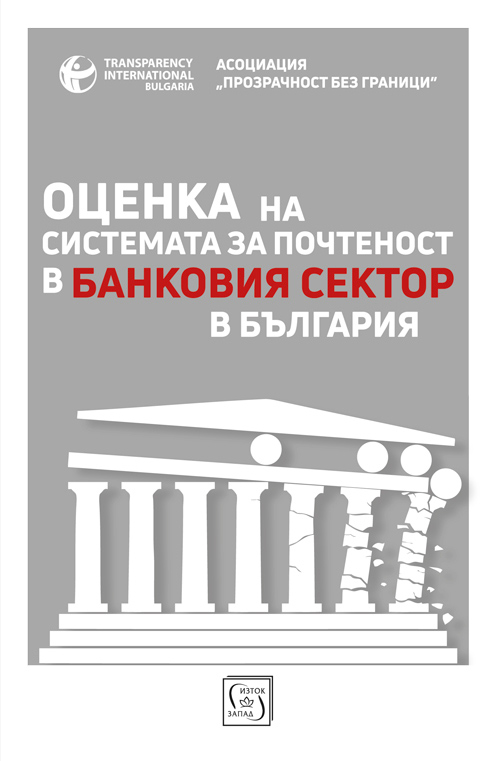
This study is provoked by one of the most significant cases of abuses over the last two decades in Bulgaria - the bankruptcy of CCB (Corporate Commercial Bank), the fourth largest bank in the country. After the 1996-1997 crisis, when one third of the banks went bankrupt, the country's banking sector collapsed. This is the second case in which huge financial resources "evaporated" and the negative consequences affected a wide range of public institutions and private subjects. The emergence of periodically recurring financial crises, with multiple impacts on public, economic and political life, motivates Transparency International Bulgaria to look for a systematic response to the problem and look beyond the specific case. The present book is based on the analytical approach of the international anti-corruption organization Transparency International "National Integrity System" which assesses clearly defined criteria, the capacity, functioning and management of sectors and institutions with key importance in counteracting corruption. The study is based on an analysis of the legislation and practical actions of the investigated institutions, a wide range of documentary sources, reports, assessments, media publications, and interviews with experts and public figures that have had direct observations and touch with the CCB case. It reflects an attempt to formulate an impartial, objective assessment of the functioning of the banking supervisory system in the 2009-2014 periods but also pursues another objective - to serve as a starting point for policies and strategic actions to give an adequate systemic response to established deficits. Viewed through this prism, this publication expresses the ambition of the Transparency International Bulgaria to not only prevent future crises of this nature, but also to contribute to the institutional strengthening of the system of supervisory institutions in Bulgaria.
More...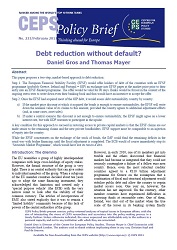
In recent weeks pressures on the euro and eurozone sovereign debtors have subsided. Buoyant growth in the global economy, increasingly benefiting also the European economy, has of course played an important role in calming financial markets. But even more important has been the perception that France and Germany are again working constructively for a strong economic Europe. More broadly, the acute turbulence in financial markets since the spring of 2010 may have finally convinced our political leaders, notably including the German political establishment, that the benefits of a stable currency far outweigh the costs that may have to be borne to make it work properly.
More...
Two years after the London G-20, the EU is making good progress towards delivering on the commitments it undertook to implement by the 2013 target date. Important steps have been taken on the institutional side, and regulatory changes are moving ahead. On some issues, such as remuneration, the EU has made even more pronounced headway than the US. But some sensitive matters remain, such as bank resolution and structural changes.
More...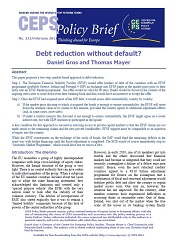
Is a high level of public debt inherently more dangerous within a monetary union? During the1990s it was often argued that only by entering the EMU could Italy (or Spain) protect itself from the high interest rates it had to pay on its large public debt. The argument was that by joining the single currency, Italy could convince financial markets that it would not inflate away the value of its debt and hence benefit from lower risk premia.
More...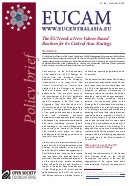
Popular legend holds that the 18th century French King, Louis XV, claimed that after his death everything would fall apart (après moi, le déluge). To outsiders, a similar uncertainty surrounds Kazakhstan and Uzbekistan to some extent, because they are both led by presidents that have been in power since 1989, even before their respective countries became independent in 1991. Nursultan Nazarbayev (74) of Kazakhstan and Islam Karimov (77) of Uzbekistan have established and maintained a firm grip on their countries, but have not indicated who might succeed them in the future. Both states are authoritarian and seek regional leadership. Kazakhstan is renowned for its natural resource-driven economic growth and international flair, and is often seen as the region’s economic engine. Uzbekistan is the most populous country in Central Asia and has a strong security sector compared to neighbours that includes relatively capable armed forces and an influential intelligence community.
More...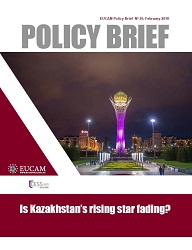
Kazakhstan’s economic prosperity and active foreign policy have given it increasing regional power status. Kazakhstan has stood out internationally as a mediator in conflicts, chair of international fora and partner to key international actors, but its ‘golden decade’ of economic growth has ended. The country faced a serious economic crisis in 2014, and registered only slightly over 1 per cent GDP growth in 2015 and 2016. Even though growth improved to approximately 3.5 per cent in 2017, due to higher oil prices and production, figures are likely to remain lower than pre-2014. In January 2017, at the initiative of ageing President Nursultan Nazarbayev, parliament approved constitutional reforms to strengthen its role, including the transfer of some presidential functions, in an effort to decentralise power.
More...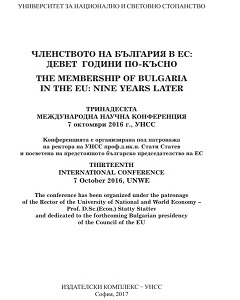
This book collects scientific papers and reports presented on the conference ‘The Membership of Bulgaria in the EU: Nine Years Later’ organized by the International Economic Relations and Business Department at University of National and World Economy (UNWE), Sofia, Bulgaria. The conference, held on 7 October 2016, was dedicated to the upcoming Bulgarian Presidency of the Council of the EU. The contributors to the present edition of the book explore topics such as European integration and Cohesion, the role of the financial centres in the EU, development in the banking sector, Banking union, Eurozone and inflation, financial risk mitigation. Researchers discuss some EU strategic goals such as the energy union and environmental policies, energy economics, electricity generation, energy markets and liberalization as well as research activities and initiatives such as the program Horizon 2020. Authors review aspects related to the organizational issues, change management, communication in organizations, business culture, corporate social responsibility, corporate governance, irregularities and financial corrections. The book contains in-depth research related to the innovations and outsourcing, digital marketing, regional financial sustainability in Bulgaria and analysis on the local tourism. ‘The Membership of Bulgaria in the EU: Nine Years Later’ is an annually organized academic event with the vision to foster open dialogue, offer contemporary research and exchange of ideas between fellow academics, policy makers, businesses, stakeholders and the public.
More...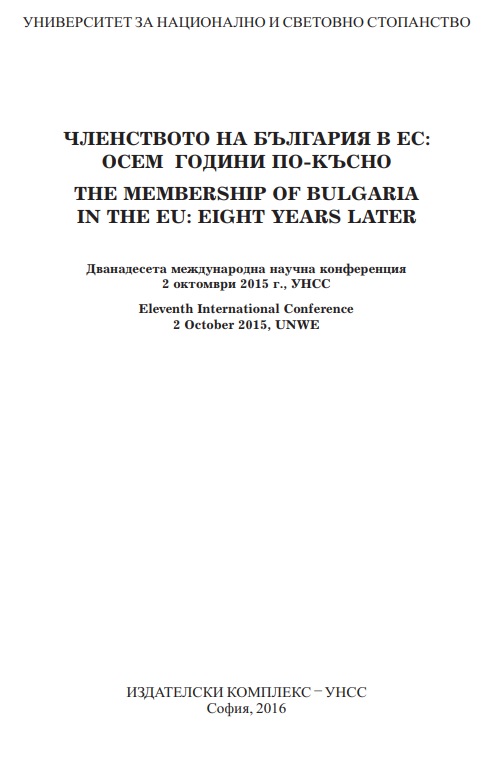
This book collects scientific papers and reports presented on the conference ‘The Membership of Bulgaria in the EU: Eight Years Later’ organized by the International Economic Relations and Business Department at University of National and World Economy (UNWE), Sofia, Bulgaria. The conference, held on 2 October 2015, traditionally provided a stage for prominent academics, dedicated PhD students and professionals to discuss contemporary topics related to multiple aspects of the European integration, its effects on the Bulgarian economy, value chain and socio-economic environment, international business and relations, financial markets and banking.The contributors to this edition of the annual conference book reviewed the European integration and development though the perspectives of the fiscal and political measures to tackle the consequences of the financial crisis in both the Euro area and the other EU member states, implications on the banking sector, foreign direct investment, risk mitigation. The financial crisis and the results in the aftermath of it (capital liquidity imbalances, fiscal instability, banking volatility, quantitative easings and Euro area performance indicators, to name a few) are dominating among the majority of authors’ research. The contributors review issues related to the corporate management, corporate governance, sustainable education, organizational design, digital marketing, ethical PR and media, talent development in large organizations. Another group of researchers offer in-depth reviews of the current EU institutional framework, emerging questions related to the energy security and the EU energy policy as well as the environment on a global level, healthcare and business innovations. ‘The Membership of Bulgaria in the EU: Eight Years Later’ is an annually organized academic event with the vision to foster open dialogue, offer contemporary research and exchange of ideas between fellow academics, policy makers, businesses, stakeholders and the public.
More...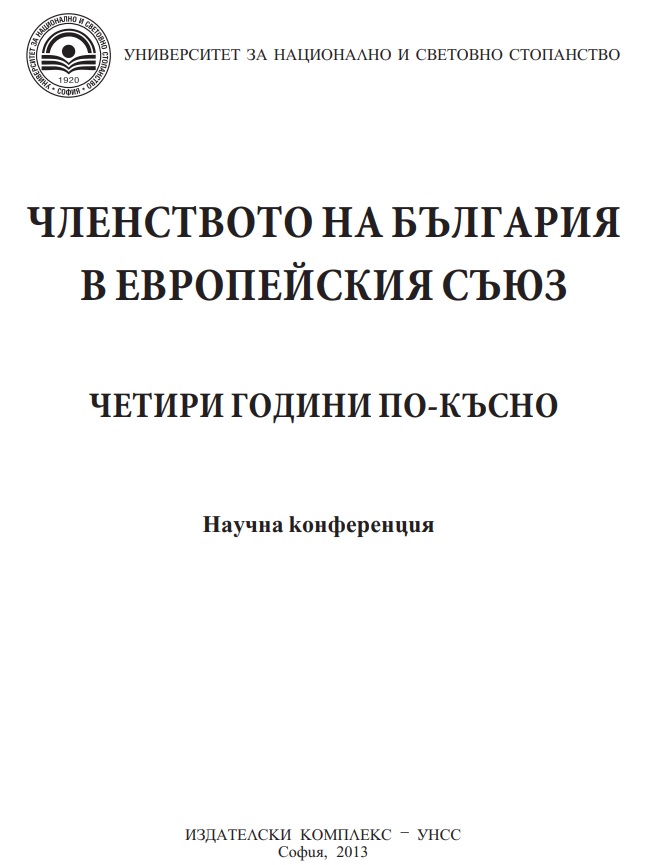
This book collects scientific papers and reports presented on the conference ‘The Membership of Bulgaria in the EU: Four Years Later’ organized by the International Economic Relations and Business Department at University of National and World Economy (UNWE), Sofia, Bulgaria. The conference, held on 3 October 2010, traditionally provided a stage for prominent academics, dedicated PhD students and professionals to discuss contemporary topics related to multiple aspects of the European integration, its effects on the Bulgarian economy, socio-economic environment, international business and relations, finance and politics.The conference was opened with a keynote speech by Meglena Kuneva who used to serve in the European Commission and is a prominent figure in the Bulgarian political life associated with the European integration process and accession to the European Union. She highlighted that the Bulgarian membership in the European Union is a rare example of widely shared national consensus in the past 22 years. Meglena Kuneva presented arguments in favour of this membership while noting challenges that remain unsolved years after our accession – we shall understand better the signs given by Brussels as well as put an emphasis on the human factors. Kuneva shared the view that commitment and high ethical and professional standards are required when appointments are made for the EU funds governance on a national level. We shall be more active towards EU in our contribution, she concluded. The participants in the conference presented research about the multiple effects on the Bulgarian economy as a result of the EU membership and access to the Single market. Authors discussed the international competitiveness of the Bulgarian export industry, they dedicated analysis on the Bulgarian trade with the other EU member states as well as industrial concentrations among the countries sharing single market. The liberalization of the telecommunications market in Bulgaria, reforms in the regulations of the pension funds and public procurement is among the topics presented. Another group of academics discussed current trends in the global economy, regional and global challenges to the EU. Those processes would have implications on the entire EU bloc. This could be related to the role of the Euro as an international currency as well as the development of the economic and monetary union (EMU) within EU. Contributors review topics related to the real and nominal convergence of Bulgaria and other countries in the EMU and the Bulgarian contribution and participation in key EU policies. Some authors present research on the challenges and achievements regarding the absorption of the EU funds in Bulgaria and implementation of the operating programs. Group of papers is dedicated to the international business environment, transnational organizations, international standardization through ISO, quality assurance and management, employees’ performance, and organizational culture. ‘The Membership of Bulgaria in the EU: Four Years Later’ is an annually organized academic event with the vision to foster open dialogue, offer contemporary research and exchange of ideas between fellow academics, policy makers, businesses, stakeholders and the public.
More...
The study was conducted within the project "Development of a multiregional partnership for education and training", contract POSDRU / 165/62 / S / 141123 and analyzed the impact of several alternative forms of employment: apprenticeship, volunteering, internship work / practice at work, distance work, Internet work, part-time employment, casual / day work, work at home / at home, flexible working hours, temporary employment / seasonal work. The target group consisted of the unemployed, jobseekers, people with disabilities, people of Roma ethnicity or coming from orphanages, as well as other people from vulnerable groups. During October-November 2015, a survey of 272 subjects, 3 focus groups and 27 in-depth interviews were conducted within this project.
More...
The research is part of the strategic project “Rural Manager” POSDRU / 13 / 5.2 / S / 8 and was conducted based on a survey to which 942 entrepreneurs and potential entrepreneurs from rural areas responded. In addition, 3 focus groups, 3 brainstorming's and 30 in-depth interviews were conducted with 80 entrepreneurs and 159 civil servants. She analyzed entrepreneurial values, building an 11-step entrepreneurial scale, entrepreneurial attitudes and behaviors, qualities and obstacles in managerial career, theoretical management knowledge held by rural employers, the need for training and entrepreneurship in business, business consulting, rural management perspectives.
More...
Savetnik predsednika Ruske Federacije i član Ruske akademije nauka Sergej Jurjevič Glazev, tokom svog nastupa na moskovskoj konferenciji „Evroazijska ekonomska integracija“, celom svetu je poručio sledeće: zbog uvedenih sankcija prema Rusiji, zemlje Evropske unije će u najskorijem roku izgubiti ni manje ni više nego 1.000.000.000.000 (trilion) evra. Naravoučenije je kratko i jasno: vi i ta vaša Evropa definitivno ste u čabru.
More...
Takozvani oligarsi u Rusiji i drugim bivšim komunističkim zemljama, buržoaski su pandan onoga što je Marks zvao lumpenproletarijatom: nemisleća kohorta podložna političkoj manipulaciji jer njeni pripadnici nemaju klasnu svest ni vlastiti revolucionarni potencijal. Međutim, za razliku od proletarijata, lumpen-buržoazija koja se u ovim zemljama javlja krajem 1980-ih, kontroliše kapital – i to mnogo kapitala – zahvaljujući divljoj „privatizaciji“ imovine u državnom vlasništvu.
More...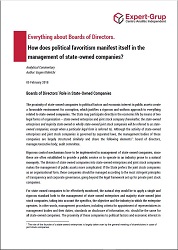
The proximity of state-owned companies to political factors and economic interest in public assets create a favourable environment for corruption, which justifies a rigorous and uniform approach to everything related to state-owned companies. The State may participate directly in the economic life by means of two legal forms of organisation – state-owned enterprise and joint stock company (hereinafter, the state-owned enterprises and majority state-owned or wholly state-owned joint stock companies will be referred to as state-owned companies, except when a particular legal form is referred to). Although the activity of state-owned enterprises and joint stock companies is governed by separated laws, the management bodies of these companies are largely structured similarly and share the following elements: board of directors, manager/executive body, audit committee.
More...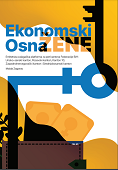
Pitanje osiguravanja rodne ravnopravnosti u skladu sa međunarodnim standardima ljudskih prava stalni je izazov s kojim se suočavaju države. Ključna pretpostavka za osiguravanje ovog principa je donošenje zakonodavnog okvira usklađenog sa međunarodnim standardima i uspostava efikasnog institucionalnog okvira. Inkorporisanje rodne ravnopravnosti u pravni sistem Bosne i Hercegovine posebno je intenzivirano donošenjem Zakona o ravnopravnosti spolova u Bosni i Hercegovini 2003. godine. Prilikom izrade ovog zakona otvorilo se pitanje koje društvene sfere treba da budu obuhvaćene Zakonom, imajući u vidu da u tom periodu, u evropskim okvirima, zakon o rodnoj ravnopravnosti je bio donesen samo u Finskoj i to sa fokusom na rodnu ravnopravnost u oblasti rada. S obzirom na rezultate analiza koje su rađene u tom periodu, a tiču se položaja žena u Bosni i Hercegovini, zaključeno je da se donese sveobuhvatan zakon kojim će se garantovati rodna ravnopravnost u svim sferama života, te da se zabranjuje diskriminacija na osnovu spola, uključujući i zabranu rodno zasnovanog nasilja koje je ovim zakonom propisano kao krivično djelo. Iako se ove godine obilježava 20. godišnjica od usvajanja Zakona o ravnopravnosti spolova u Bosni i Hercegovini, bosansko-hercegovačko društvo i dalje se suočava s pitanjem kako obaveze iz ovog zakona, a samim tim i iz međunarodnih standarda koje je Bosna i Hercegovina ratifikovala, provesti u praksi.
More...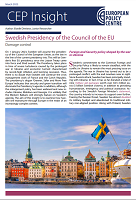
On 1 January 2023, Sweden will assume the presidency of the Council of the European Union, as the last in the line of the current presidency trio. This will be Sweden’s first EU presidency since the Lisbon Treaty came into force and third overall. The Presidency takes place in time of severe turbulence caused by the prolonged war in Ukraine and economic turmoil characterised by record-high inflation and looming recession. Thus, there is no doubt that Sweden will continue the crisis management work of France and the Czech Republic. The presidency’s slogan ‘Greener, Safer and More Free Europe’ indicates that security and green transition will dominate the Presidency’s agenda. In addition, although the enlargement policy has been widened and now includes Ukraine, Moldova and Georgia, it is unlikely that the Western Balkans will strongly feature on Sweden’s agenda. The aim of this insight is to examine how Sweden will manoeuvre through Europe in the midst of an increasingly complex context.
More...